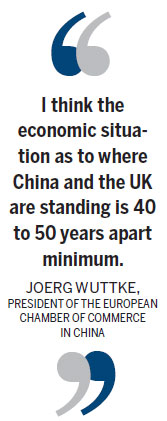Industry will continue to play a key role
Updated: 2015-01-30 08:38
By Andrew Moody(China Daily Europe)
|
|||||||||||
The UK could prove to be a role model for China in developing its services sector, according to some experts.
Services made up 46 percent of UK GDP - approximately the same as China now - in 1948; but this rose to 78 percent in 2012.
The number of people employed in the services sector over the same period has gone up from 44 to 85 percent.
Henry Bell, first secretary at the British embassy in Beijing, admits the UK stands out in the way services dominates its economy.
"The UK is a bit of an outlier because it is unusually services-sector dominated. The average developed economy has a service sector of between 60 and 70 percent."
He says the major growth area of the Chinese economy is now in services, despite many such as financial services and telecommunications being mostly barred to foreign investment.
"There is no question that the Chinese services sector is growing faster than the manufacturing sector, despite a significant slowdown in growth over the past couple of years. That is one of the reasons why policymakers are relaxed about the state of the economy."
Joerg Wuttke, president of the European Chamber of Commerce in China, says the UK would be a very difficult model for China to emulate.
"I think the economic situation as to where China and the UK are standing is 40 to 50 years apart minimum. I think to take a role model so far ahead of yourself would be inadvisable for China.

"China would be better looking at the development of the Republic of Korea and the moves they have made into services."
Wuttke, also chief China representative for BASF and who has lived in the country for 17 years, says having a strong manufacturing base like Germany, where it makes up 20 percent of GDP compared to the UK's 12 percent, gives an economy more stability.
"The US and the UK have to some extent de-industrialized. I think having a strong manufacturing base gives you stability in order to get through a crisis. You have less volatility than strong service-sector orientated economies."
Xu Bin, professor of economics at China Europe International Business School in Shanghai, believes China should not place too much emphasis on services because its comparative advantage will remain in manufacturing.
"I think this will be the case for many years to come even though services may play a bigger role."
He says it is also wrong to assume that more services will mean more high-paid jobs in high-end services.
"In the early stages we might be taking of low-end service jobs. Middle class families in cities need people to do their housekeeping and care for their kids so migrant workers move from the countryside to the cities to do this work. People eat out more so a lot of the service jobs being created will be in restaurants," he says.
"It might take another 20 to 30 years before high-end services become a key feature of the Chinese economy. I think manufacturing will remain China's comparative advantage for some time to come."
(China Daily European Weekly 01/30/2015 page7)
Today's Top News
EU prolongs sanctions against Russia
Italy's presidential election begins
China's port project in Greece not affected
Royal Mail Chairman to step down
Trial finds GSK Ebola shot safe, with immune response
Russian Delegation stripped of voting rights at PACE
China and Greece 'willing to continue cooperation'
China hails German leaders' call to remember history
Hot Topics
Lunar probe , China growth forecasts, Emission rules get tougher, China seen through 'colored lens', International board,
Editor's Picks

|

|

|

|

|

|





